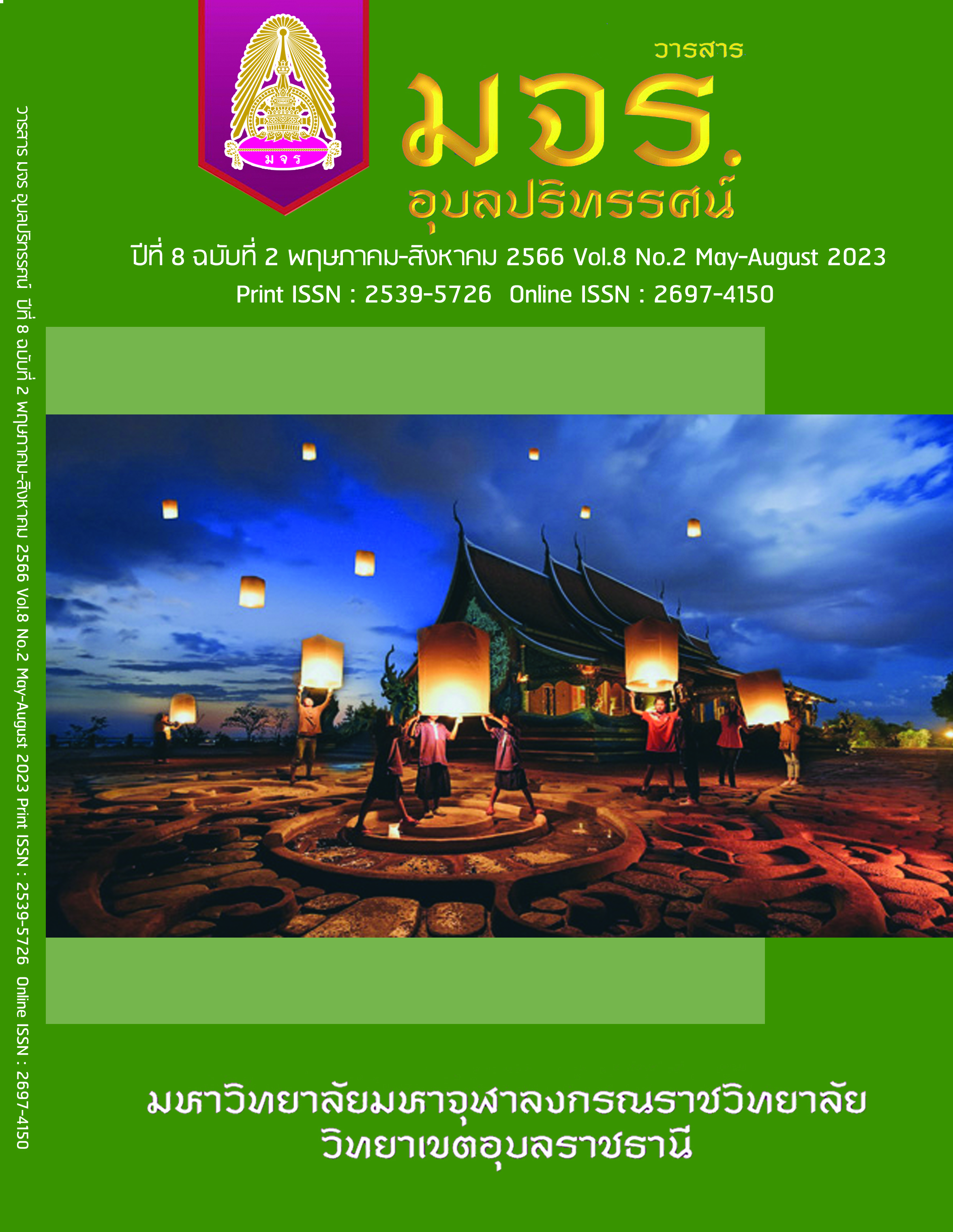NEEDS ASSESSMENT AND DEVELOPMENTAL GUIDELINES FOR PARENTS’ PARTICIPATION IN ENHANCING STUDENT'S LEARNING POTENTIAL IN EDUCATION EXPANSION SCHOOLS UNDER THE OFFICE OF UDON THANI PRIMARY EDUCATIONAL SERVICE AREA 3
Main Article Content
Abstract
This Article aimed to study (1) the current condition of parents’ participation in enhancing student’s learning potential; (2) the expectation for parents’ participation in enhancing student’s learning potential; (3) the needs for parents’ participation in enhancing student’s learning potential; and (4) developmental guidelines for parents’ participation in enhancing student’s learning potential in education expansion schools.The research findings revealed that (1) the overall current condition of parents’ participation in enhancing student’s learning potential was rated at the high level; (2) the overall expected condition of parents’ participation in enhancing student’s learning potential was rated at the highest level; (3) the needs assessment indices were in the range of 0.16 – 0.21; and (4) the main developmental guidelines for parents’ participation in enhancing student’s learning potential could be divided into six aspects as follows: (4.1) in the aspect of child rearing, the parents should encourage their children to engage in physical exercises regularly, and they should provide them with nutritious food; (4.2) in the aspect of communication, the school should organize the meeting with the parents before the start of the semester in order to create the mutual understanding with the parents, and the parents and the homeroom teachers should cooperate in solving the students’ problems; (4.3) in the aspect of voluntariness, the parents should support and promote their children’s readiness on learning materials and equipment, and the school should allow the parents to have opportunity to participate in improving the school environment that facilitates the students’ learning; (4.4) in the aspect of learning at home, the parents should organize activities at home that are consistent with and promote their children’s learning, they should check the correctness and tidiness of their children’s work, and they should organize the home environment that facilitates their children’s learning; (4.5) in the aspect of voluntary-mindedness, the school should allow the parents to have opportunity to participate in determination of the model and methods of learning management as well as participation in monitoring and evaluation of their children’s learning outcomes; and (4.6) in the aspect of cooperation with the community, the parents should encourage their children to participate in community development activities, and they should promote their children’s learning by taking them to study-tour various learning resources.
Article Details
References
กระทรวงศึกษาธิการ. (2546). พระราชบัญญัติการศึกษาแห่งชาติ พ.ศ.2542 และที่แก้ไขเพิ่มเติม
(ฉบับที่2) พ.ศ. 2545. กรุงเทพฯ : กระทรวงศึกษาธิการ.
กระทรวงศึกษาธิการ. (2548). การจัดการเรียนการสอนที่เน้นผู้เรียนเป็นสำคัญ ชุดการเรียนรู้ด้วย
ตนเองชุดที่ 8 โครงการหนึ่งอำเภอ หนึ่งโรงเรียนในฝัน. กรุงเทพฯ: กระทรวงศึกษาธิการ.
ชนม์ธิดา ยาแก้ว, นางสาวนิศารัตน์ อิสระมโนรส, นางสาวอัญชิษฐา ปิยะจิตติ, นางสาวรวี ศิริปริ-ชยากร และ นางสาวจิราภรณ์ ยกอินทร. (2560). การมีส่วนร่วมของผู้ปกครองในการส่งเสริม
การเรียนรู้ของเด็กปฐมวัยของศูนย์พัฒนาเด็กเล็ก เขตพื้นที่ภาคตะวันออก (รายงานการ
วิจัย). มหาวิทยาลัยสวนดุสิตล, กรุงเทพฯ.
นันทวีร์ พงษ์นาค. (2561). การมีส่วนร่วมของผู้ปกครองในการจัดการศึกษาปฐมวัยโรงเรียนชุมชนบ้านทุ่งโพธิ์สังกัดสำนักงานเขตพื้นที่การศึกษาประถมศึกษาปราจีนบุรี เขต 2. บัณฑิตวิทยาลัย:
มหาวิทยาลัยบูรพา, ชลบุรี.
สมปอง โพธิตะนิมิตร. (2558). ความต้องการของผู้ปกครองในการจัดการศึกษาระดับปฐมวัย
โรงเรียนบ้านคลองเจริญ สังกัดสำนักงานเขตพื้นที่การศึกษาประถมศึกษาสระแก้ว เขต 1 บัณฑิตวิทยาลัย:มหาวิทยาลัยบูรพา, ชลบุรี.
สมยศ นาวีการ. (2545). การบริหารแบบมีส่วนร่วม. กรุงเทพฯ: บรรณกิจ 1991 จำกัด.
สำนักงานเขตพื้นที่การศึกษาประถมศึกษาอุดรธานี เขต 3. (2563). แผนปฏิบัติการประจำปี
งบประมาณ พ.ศ.2563 สำนักงานเขตพื้นที่การศึกษาประถมศึกษาอุดรธานี เขต 3.
อุดรธานี : สำนักงานเขตพื้นที่การศึกษาประถมศึกษาอุดรธานี เขต 3.
สำนักงานเขตพื้นที่การศึกษาประถมศึกษาอุดรธานี เขต 3. (2565). ข้อมูลพื้นฐานโรงเรียน สังกัด
สำนักงานเขตพื้นที่การศึกษาประถมศึกษาอุดรธานี เขต 3. อุดรธานี : สำนักงานเขตพื้นที่
การศึกษาประถมศึกษาอุดรธานี เขต 3.
สุภมาส อังศุโชติ และชูชาติ พ่วงสมจิตร์. (2558). หน่วยที่ 11 การวิเคราะห์และการแปรผลข้อมูล.
ใน ประมวลสาระชุดวิชาการวิจัยการบริหารการศึกษา หน่วย ที่ 8-15 (น.21). นนทบุรี:
สาขาวิชาศึกษาศาสตร์ มหาวิทยาลัยสุโขทัยธรรมาธิราช.
สุวิมล ว่องวาณิช. (2550). การวิจัยประเมินความต้องการจำเป็น. กรุงเทพฯ: สำนักพิมพ์แห่ง
จุฬาลงกรณ์มหาวิทยาลัย.
Epstein, J.L. (1995). School/family/community partnerships: Caring for the children
we share. Phi Delta Kappan, 76(9), 701–712.
Epstein, J.L., et al. (2019). School, Family, and Community Partnerships: Your
Handbook for Action. Fourth edition. Thousand Oaks, CA: Corwin Press.
Krejcie, R. V., & Morgan, D. W. (1970). Determining sample size for research activities.
Educational and Psychological Measurement, 30(3), 607–610.
Robbie L. Swint Jr. (2020). Influence of Parental Involvement on Sixth Grade
Student Achievement in Math. (Doctoral Dissertation). University of Grand Canyon.

